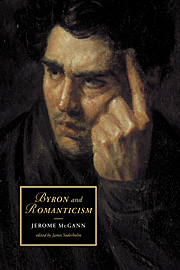Book contents
- Frontmatter
- Contents
- Acknowledgments
- General analytical and historical introduction
- PART I
- 1 Milton and Byron
- 2 Byron, mobility, and the poetics of historical ventriloquism
- 3 “My brain is feminine”: Byron and the poetry of deception
- 4 What difference do the circumstances of publication make to the interpretation of a literary work?
- 5 Byron and the anonymous lyric
- 6 Private poetry, public deception
- 7 Hero with a thousand faces: the rhetoric of Byronism
- 8 Byron and the lyric of sensibility
- 9 Byron and Wordsworth
- PART II
- Subject index
- Authors index
- CAMBRIDGE STUDIES IN ROMANTICISM
- References
9 - Byron and Wordsworth
Published online by Cambridge University Press: 22 September 2009
- Frontmatter
- Contents
- Acknowledgments
- General analytical and historical introduction
- PART I
- 1 Milton and Byron
- 2 Byron, mobility, and the poetics of historical ventriloquism
- 3 “My brain is feminine”: Byron and the poetry of deception
- 4 What difference do the circumstances of publication make to the interpretation of a literary work?
- 5 Byron and the anonymous lyric
- 6 Private poetry, public deception
- 7 Hero with a thousand faces: the rhetoric of Byronism
- 8 Byron and the lyric of sensibility
- 9 Byron and Wordsworth
- PART II
- Subject index
- Authors index
- CAMBRIDGE STUDIES IN ROMANTICISM
- References
Summary
They met intimately just once, in the spring of 1815, at Samuel Rogers's house. Wordsworth “talked too much,” according to Rogers, but Byron wasn't put off. At home afterwards he told his wife Annabella that “I had but one feeling from the beginning of the visit to the end – reverence” (Lovell, His Very Self and Voice, 129). And that's all we know about the only meeting between the two dominating English poets of the period. To us now, that foregone scene might easily recall the Romantic passage in The Age of Bronze where Byron describes the great forensic rivalry of Fox and Pitt:
We, we have seen the intellectual race
Of giants stand, like Titans, face to face—
Athos and lda, with a dashing sea
Of eloquence between.
(13–16)So will distance lend enchantment to a view of people and events. Imagined more closely, the meeting of Byron and Wordsworth must have been riven with awkwardness. Both were conscious of the other's eminence. Rogers had arranged his dinner specifically to bring them together. They were also well aware of Byron's public comments on Wordsworth's poetry – his review of the 1807 Poems, and his general critique mounted in two passages of English Bards and Scotch Reviewers (235–254 and 903–905). Byron must have been somewhat chagrined by the recollection of those writings, for while they clearly showed great respect – if not exactly “reverence” – for Wordsworth, they were also forthright, as Byron always was, with their disapprovals.
- Type
- Chapter
- Information
- Byron and Romanticism , pp. 173 - 202Publisher: Cambridge University PressPrint publication year: 2002
References
- 6
- Cited by

